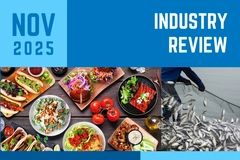
- Industry news
Industry news
- Category news
Category news
- Reports
- Key trends
- Multimedia
- Journal
- Events
- Suppliers
- Home
- Industry news
Industry news
- Category news
Category news
- Reports
- Key trends
- Multimedia
- Events
- Suppliers
Menu for change: Gen Z innovators push for “tangible impact” on EU food system
Food innovation community EIT Food is encouraging Gen Z innovators to tackle the EU’s most pressing food system challenges, such as extreme weather events that threaten food security. From cooked dehydrated beans as an alternative to animal proteins, to food systems connecting consumers with local food, its Menu for Change Challenge winners attempted to “revolutionize Europe’s food system.”
The EU-supported organization’s competition focused on innovative ideas for six key priorities: regenerative farming; clear and accessible food labelling; food cost inclusion; true cost of food; food waste reduction and food education.
The challenge was inspired by and based on EIT Foods’ FutureFoodMakers’ manifesto for the food system Menu For Change, in which “ten young innovators across Europe demand EU-wide change to transform the food system to be more sustainable, resilient, and inclusive,” Karina Akopian, junior education program manager at EIT Food, tells Food Ingredients First.
“We know that young people are playing a critical role in driving forward innovation and progress in the food system. We wanted to create the Menu for Change Challenge to empower young entrepreneurs with the resources, mentorship, and platforms to scale their ideas.”
The five winning teams from 11 countries (six EU, five non-EU), will each receive €5,000 (US$ 5,242.6), expert mentorship, and the chance to pitch at events like EIT Food Next Bite 2025 and IFT FIRST Annual Expo.
Advancing local food systems
The winners include Alnarp’s Agroecology Farm (Sweden) and Nutrifood (Kenya), which focus on sustainable farming and local food systems; Agroboros (Netherlands), which targets education and awareness in agriculture; and Greenovators (Turkey) and The Menza Collective (Germany and Czech Republic), which implement sustainable food procurement and cafeteria practices.
Alnarp’s Agroecology Farm is a student-run community-supported agriculture (CSA) farm at Swedish Agricultural University that has developed a food system to connect consumers to local food.
 The challenge aimed to equip young entrepreneurs with resources, mentorship, and platforms to scale their ideas, says Akopian.“Our farm is a ‘living lab’ for agroecological practices, offering internships, educational events, and partnerships with local businesses. We aim to inspire lasting change by making local, sustainable food accessible and fostering a resilient community,” says the team.
The challenge aimed to equip young entrepreneurs with resources, mentorship, and platforms to scale their ideas, says Akopian.“Our farm is a ‘living lab’ for agroecological practices, offering internships, educational events, and partnerships with local businesses. We aim to inspire lasting change by making local, sustainable food accessible and fostering a resilient community,” says the team.
Meanwhile, the Nutrifood project by students at the University of Applied Sciences Weihenstephan Triesdorf, Germany, produced “pre-cooked dehydrated beans” as an eco-friendly alternative to animal proteins.
“By sourcing from regenerative farms, Nutrifood promotes soil nutrient management, carbon sequestration, and the transition to sustainable farming practices,” notes the team.
Addressing the youth-agriculture “disconnect”
The Agroboros project, led by students from Wageningen University in the Netherlands, aims to develop a deep understanding of food production, sustainability, and environmental stewardship in children aged 3-10 through summer programs.
“Agroboros addresses a critical gap: disconnect between youth and agriculture. Our approach combines experiential learning with values-driven education, inspiring children to become active participants in sustainable food systems,” says the team.
Meanwhile, the Greenovators project focuses on sustainable university cafeteria sourcing in Turkey, staff education, and student engagement in eco-friendly food practices.
“Our main goals are to enhance the knowledge and sensitivity of students on the topic of sustainable food while reducing the environmental impact of food catering processes,” underscores the team.
Another team eyeing sustainable cafeteria sourcing is The Menza Collective, which is composed of students from Germany’s University of Hohenheim and the Czech University of Life Sciences Prague.
“Our project aims to promote sustainable food procurement in university cafeterias by exploring how key institutional actors (students, staff, and faculty) perceive and construct sustainability. Through interviews, we will capture diverse perspectives to understand how these views influence decision-making,” the team explains.
Need for youth engagement
The challenge’s implementation is youth-led, owing to EIT Foods’ Young Professionals Platform and the managing organizations YPARD, APPatEIT and EIT Food Alumni.
Genna Tesdall, director of Germany-based YPARD, which focuses on agricultural development, tells Food Ingredients First that youth engagement is more than just inviting youth to participate.
 The Agroboros project provides summer programs for children aged 3-10 to bridge the gap between youth and agriculture. “It’s about putting young people in the driver’s seat — and that means from start to finish of an action. We know that a lack of influence is a force driving young people away from agri-food systems.”
The Agroboros project provides summer programs for children aged 3-10 to bridge the gap between youth and agriculture. “It’s about putting young people in the driver’s seat — and that means from start to finish of an action. We know that a lack of influence is a force driving young people away from agri-food systems.”
Akopian adds that the winning projects demonstrate a “clear understanding” of the challenges and the urgency of transforming the EU’s food system.
“Supporting these projects and fostering the potential of young innovators is vital to build a future-fit, resilient, and inclusive food system.”
Creating a tangible impact
Akopian tells us the winning teams will join the EIT Food FutureFoodMakers’ efforts to activate the Menu for Change through their initiatives in their respective countries, “which can then be presented to national policymakers.”
“We believe that these teams of talented young innovators not only will create a tangible impact with their actions, but will act as an inspiring example for the youth to take action in transforming the food system.”
While the initiatives currently focus on the EU, she says the FutureFoodMakers and the Menu for Change’s methodology and priorities have the potential and relevance to go “beyond the European Union.”
“Seeding the Future Foundation has held similar competitions in Sub-Saharan Africa, and YPARD, in Africa, LAC, and Asia-Pacific. Menu for Change will be hosting future competitions, challenges, and opportunities for youth to get involved.”

















